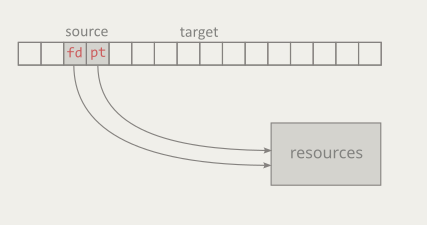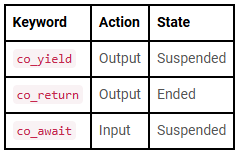Exclusive state access, I -- Andrzej Krzemieński
 Value semantics is a way of structuring programs around what values mean, not where objects live, and C++ is explicitly designed to support this model. In a value-semantic design, objects are merely vehicles for communicating state, while identity, address, and physical representation are intentionally irrelevant.
Value semantics is a way of structuring programs around what values mean, not where objects live, and C++ is explicitly designed to support this model. In a value-semantic design, objects are merely vehicles for communicating state, while identity, address, and physical representation are intentionally irrelevant.
Exclusive state access, I
by Andrzej Krzemieński
From the article:
Value semantics is a way of organizing your programs, which C++ supports and endorses. Its key characteristics in a nutshell:
- Throughout its lifetime an object (via its type and special member functions) is used to represent a value.
- Different parts of the program communicate values via objects. While the value matters, objects themselves (their address, their
sizeof) do not.- Object’s value is isolated from other objects’ values.
This begs the question, what is value, but we will not answer it. First, because it is difficult, and maybe impossible. It is pretty clear what value objects of type
intrepresent. It is fairly uncontroversial what value is represented byvector<int>, once we accept that the value representation need not fit into thesizeofof the object, but can spread across other memory locations and resources, and that vector’s capacity is not part of this value, even though it is part of its state. But there are things likestd::mutexwhere naming the value is tricky.

 In today's post, I like to touch on a controversial topic: singletons. While I think it is best to have a codebase without singletons, the real-world shows me that singletons are often part of codebases.
In today's post, I like to touch on a controversial topic: singletons. While I think it is best to have a codebase without singletons, the real-world shows me that singletons are often part of codebases. Conferences are never just about the talks — they’re about time, travel, tradeoffs, and the people you meet along the way. After a year of attending several C++ events across formats and cities, this post is a personal look at how different conferences balance technical depth, community, and the experience of being there.
Conferences are never just about the talks — they’re about time, travel, tradeoffs, and the people you meet along the way. After a year of attending several C++ events across formats and cities, this post is a personal look at how different conferences balance technical depth, community, and the experience of being there. C++20 introduced coroutines. Quasar Chunawala, our guest editor for this edition, gives an overview.
C++20 introduced coroutines. Quasar Chunawala, our guest editor for this edition, gives an overview. Filtering items from a container is a common situation. Bartłomiej Filipek demonstrates various approaches from different versions of C++.
Filtering items from a container is a common situation. Bartłomiej Filipek demonstrates various approaches from different versions of C++. std::chrono::high_resolution_clock sounds like the obvious choice when you care about precision, but its name hides some important caveats. In this article, we’ll demystify what “high resolution” really means in <chrono>, why this clock is often just an alias, and when—if ever—it’s actually the right tool to use.
std::chrono::high_resolution_clock sounds like the obvious choice when you care about precision, but its name hides some important caveats. In this article, we’ll demystify what “high resolution” really means in <chrono>, why this clock is often just an alias, and when—if ever—it’s actually the right tool to use. Memory-safety vulnerabilities remain one of the most persistent and costly risks in large-scale C++ systems, even in well-tested production code. This article explores how hardening the C++ Standard Library—specifically LLVM’s libc++—can deliver meaningful security and reliability gains at massive scale with minimal performance overhead.
Memory-safety vulnerabilities remain one of the most persistent and costly risks in large-scale C++ systems, even in well-tested production code. This article explores how hardening the C++ Standard Library—specifically LLVM’s libc++—can deliver meaningful security and reliability gains at massive scale with minimal performance overhead.